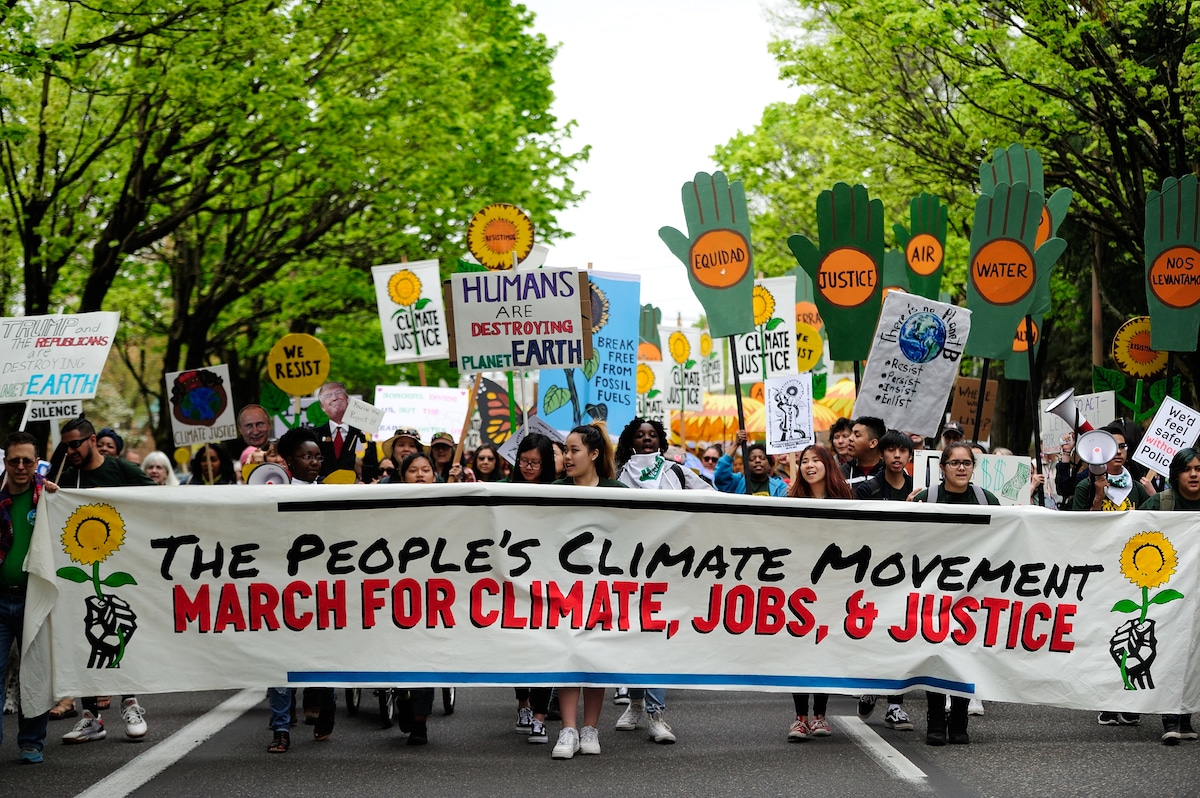Montana Sues Portland, Oregon Over Fossil Fuel Terminal Ban

 Why you can trust us
Why you can trust us
Founded in 2005 as an Ohio-based environmental newspaper, EcoWatch is a digital platform dedicated to publishing quality, science-based content on environmental issues, causes, and solutions.
In 2016, the Portland, Oregon, city council unanimously approved a ban on either building new fossil fuel terminals within the city or expanding existing ones.
At the time, Inside Climate News reported it was likely the first time a city had used zoning laws to restrict the use of fossil fuels, and climate activists hailed the creative strategy.
“Portland is taking bold steps to protect our city from the immediate risks of fossil fuels while sending a powerful message to other cities across the nation and the world that the grassroots movement will not let national politics deter cities from taking the lead on climate action,” 350PDX organizer Mia Reback said in a statement reported by Inside Climate News at the time.
But Portland’s policy — which has been revised and updated since it first passed — did not please everyone. On Tuesday, the state of Montana and four fossil fuel trade groups sued the city over a policy they argue discriminates against interstate trade, as Oregon Public Broadcasting (OPB) reported.
“The Portland government is artificially and intentionally preventing new and expanded infrastructure in order [to] achieve its politically motivated ‘climate action plan,’” Montana Attorney General Austin Knudsen said in a press release. “Further, Portland’s hypocritical policies kneecap Montana industries and workers from getting our energy products to market while trying to protect its own citizens from the consequences of its short-sighted actions.”
The Portland policy works by designating “Bulk Fossil Fuel Terminals” as a new land use category and then prohibiting them in all zones of the city, according to Inside Climate News. Bulk Fossil Fuel Terminals are defined as fossil fuel storage sites linked to pipeline, rail or marine transit infrastructure as well as those holding at least two million gallons of fossil fuels. The policy was updated in 2019 and 2022, according to OPB.
The Portland policy does allow for certain exemptions to provide fuel to gas stations, airports and the terminals in place prior to the ban, which largely go to regional operations, Reuters reported. These exceptions are what the lawsuit hinges upon, arguing that the policy discriminates against out-of-state businesses. It therefore violates the Dormant Commerce Clause, Foreign Commerce Clause, and Due Process Clause of the U.S. Constitution, as Montana Department of Justice explained in a press release. In particular, Montana is concerned that the policy blocks it and other midwestern fuels from Asian markets, according to Reuters.
The suit was filed in the Portland Division of the U.S. District Court for the District of Oregon, and the industry plaintiffs are the Western Energy Alliance, Pacific Propane Gas Association, Idaho Petroleum Marketers and Convenience Store Association and Christensen, Inc.
Portland’s policy has withstood legal challenges in the past, however, as OPB explained. Immediately after it passed, the Western States Petroleum Association sued to block it.The Oregon Land Use Board of Appeals ruled that the policy could remain in place, but that the city needed to support it with more data going forward. Another lawsuit in 2018 was rejected by the Oregon Court of Appeals because of a reason that might save the policy this time as well: Portland’s existing fossil fuel terminals are placed along a stretch of the Willamette River that is vulnerable to earthquakes. A 2020 study found that a quake could lead to a spill of at least 95 million gallons from these terminals and cause as much as $2.6 billion in damages. Adding more fuel to the proverbial fire would not help matters.
“There’s extensive records at this point about terrifying data about what will happen to the shores of the Willamette during an earthquake,” climate-justice organization Breach Collective lawyer Nick Caleb said, as OPB reported. “I hope the federal court agrees we have a legal purpose in allowing that risk not to expand.”
Subscribe to get exclusive updates in our daily newsletter!
By signing up, you agree to the Terms of Use and Privacy Policy & to receive electronic communications from EcoWatch Media Group, which may include marketing promotions, advertisements and sponsored content.

 233k
233k  41k
41k  Subscribe
Subscribe 




